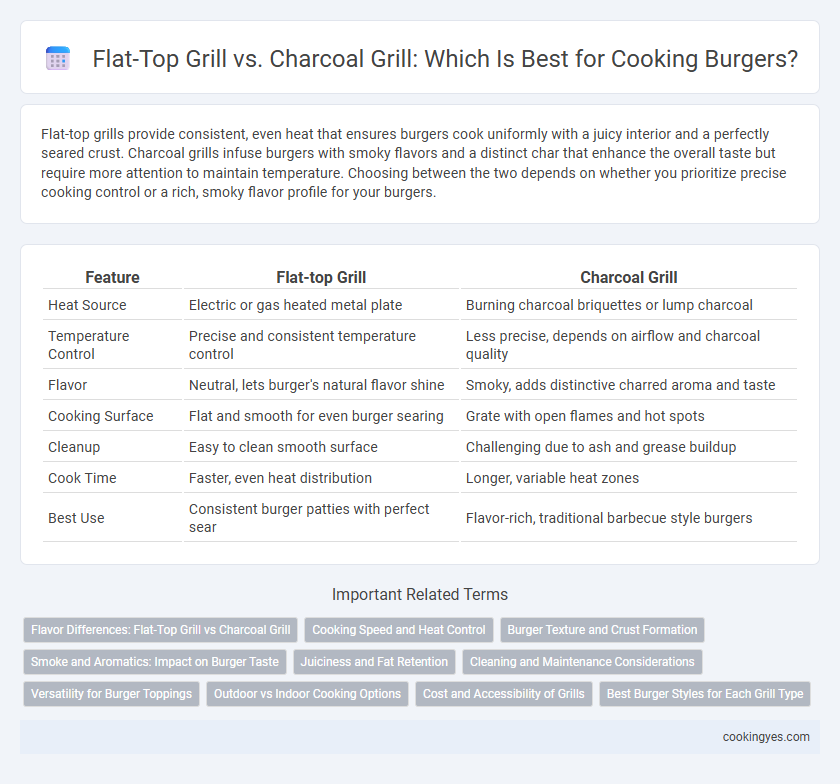Flat-top grills provide consistent, even heat that ensures burgers cook uniformly with a juicy interior and a perfectly seared crust. Charcoal grills infuse burgers with smoky flavors and a distinct char that enhance the overall taste but require more attention to maintain temperature. Choosing between the two depends on whether you prioritize precise cooking control or a rich, smoky flavor profile for your burgers.
Table of Comparison
| Feature | Flat-top Grill | Charcoal Grill |
|---|---|---|
| Heat Source | Electric or gas heated metal plate | Burning charcoal briquettes or lump charcoal |
| Temperature Control | Precise and consistent temperature control | Less precise, depends on airflow and charcoal quality |
| Flavor | Neutral, lets burger's natural flavor shine | Smoky, adds distinctive charred aroma and taste |
| Cooking Surface | Flat and smooth for even burger searing | Grate with open flames and hot spots |
| Cleanup | Easy to clean smooth surface | Challenging due to ash and grease buildup |
| Cook Time | Faster, even heat distribution | Longer, variable heat zones |
| Best Use | Consistent burger patties with perfect sear | Flavor-rich, traditional barbecue style burgers |
Flavor Differences: Flat-Top Grill vs Charcoal Grill
Flat-top grills deliver a consistent, even cooking surface that sears burgers with a caramelized crust, enhancing savory, buttery flavors through Maillard reactions. Charcoal grills infuse burgers with smoky, charred notes, adding complexity and depth due to the combustion of natural wood or briquettes. Flavor profiles from flat-top grills lean towards rich, toasted meatiness, while charcoal grills emphasize aromatic smokiness and slight bitterness.
Cooking Speed and Heat Control
A flat-top grill offers faster cooking speeds due to its consistent, direct heat and large surface area, allowing multiple burgers to cook evenly at once. Charcoal grills provide superior heat control through adjustable vents and variable charcoal placement, enabling precise temperature management for searing and smoky flavor infusion. For faster cooking with reliable heat distribution, the flat-top grill excels, while charcoal grills give more nuanced control over heat intensity for flavor customization.
Burger Texture and Crust Formation
Flat-top grills produce a consistent, even heat that creates a uniform crust and a juicier, tender burger texture by locking in moisture. Charcoal grills impart a smoky flavor and create a distinct, charred crust with a slightly firmer texture due to the higher, uneven heat distribution. Choosing between the two depends on whether the priority is a balanced, juicy interior (flat-top) or a smoky, textured exterior (charcoal).
Smoke and Aromatics: Impact on Burger Taste
Flat-top grills provide consistent heat and a smooth cooking surface, enhancing the burger's caramelization and delivering a rich, savory crust without overwhelming smoke flavor. Charcoal grills infuse burgers with distinctive smoky aromatics that impart a complex, wood-fired taste, intensifying the overall flavor profile. The choice between flat-top and charcoal directly influences the burger's depth of flavor, balancing between clean sear notes and robust smoky undertones.
Juiciness and Fat Retention
Flat-top grills provide consistent, even heat that helps retain the burger's juiciness by searing the patty quickly and locking in fat. Charcoal grills impart a smoky flavor but often cook at uneven temperatures, which can cause fat to drip away and reduce moisture. For maximizing juiciness and fat retention, flat-top grills offer superior control and heat distribution compared to charcoal grills.
Cleaning and Maintenance Considerations
Cleaning a flat-top grill involves easily scraping off grease and food residue due to its smooth surface, which reduces buildup and simplifies maintenance. Charcoal grills require extensive cleaning of ash and soot after each use, increasing time and effort for proper upkeep. Flat-top grills tend to have longer lifespans since they avoid corrosive ash residue commonly found in charcoal grills, making them more durable for frequent burger cooking.
Versatility for Burger Toppings
Flat-top grills offer superior versatility for burger toppings by providing an even, controlled cooking surface ideal for melting cheese and heating diverse ingredients like sauteed onions, peppers, and mushrooms simultaneously. Charcoal grills impart a distinct smoky flavor that enhances the burger patty but require indirect heat zones for delicate toppings, limiting the range of ingredients that can be cooked or warmed directly on the grill. For chefs prioritizing customization and variety in burger toppings, flat-top grills deliver consistent temperature control and ample space to prepare multiple components efficiently.
Outdoor vs Indoor Cooking Options
Flat-top grills offer precise temperature control and consistent heat distribution, making them ideal for indoor burger cooking in kitchens or covered patios. Charcoal grills provide smoky flavors and high heat ideal for outdoor cooking, enhancing burger taste with natural smoke infusion. Choosing between these grills depends on whether the cooking environment prioritizes controlled indoor settings or authentic outdoor grilling experiences.
Cost and Accessibility of Grills
Flat-top grills typically cost more upfront but offer consistent temperature control and easier accessibility through various retailers and commercial suppliers. Charcoal grills are generally less expensive, with widespread availability and simple maintenance, making them a budget-friendly option for outdoor burger cooking. Considering fuel costs, charcoal requires continuous purchase of briquettes or lump charcoal, while flat-top grills run on propane or electricity, influencing long-term affordability.
Best Burger Styles for Each Grill Type
Flat-top grills excel in creating juicy, evenly cooked burgers with a consistent sear, making them ideal for classic American-style cheeseburgers and smash burgers that benefit from uniform heat distribution. Charcoal grills impart a distinctive smoky flavor and charred crust, perfect for robust, flame-grilled burgers like BBQ bacon burgers and spicy jalapeno patties that thrive on intense, wood-fired aromas. Selecting the grill type based on burger style enhances texture and flavor, catering to diverse culinary preferences.
Flat-top grill vs Charcoal grill for burger cooking Infographic

 cookingyes.com
cookingyes.com